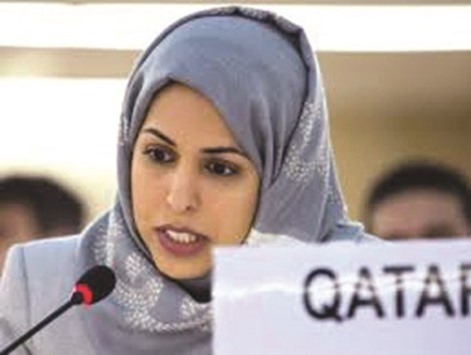The State of Qatar has reaffirmed that it will continue to support UN Security Council’s efforts to put an end to the phenomenon of trafficking in persons in conflict-affected areas, and to achieve international peace and security in the region and the world.
Qatar stressed that the success of the international community to end this phenomenon requires concerted efforts to address its causes and finding just solutions to conflicts and crises.
This came in a statement made by the Permanent Representative of Qatar to the United Nations ambassador Sheikha Alia Ahmed bint Seif al-Thani during the Ministerial-level open debate of the Security Council on Trafficking in Persons in Conflict Situations.
The statement pointed out that Qatar has supported the United Nations Global Plan of Action to Combat Trafficking in Persons since its launch, and has taken legislative measures to issue a law against trafficking in persons which criminalises trafficking in all its forms and patterns.
The statement noted Qatar’s efforts in combating crime as it hosted the 13th Congress on Crime Prevention last year, which resulted in the Doha Declaration and adopted a comprehensive approach to address the crime of human trafficking.
It pointed out that Qatar is one of the biggest supporters of the UN Office on Drugs and Crime (UNODC) as the main UN reference to combat trafficking in persons.
The statement also added that Qatar is one of the biggest donors to the United Nations Trust Fund for Victims of Trafficking in Persons since its inception.
Moreover, the statement said that the reports presented at the Ministerial-level open debate of the Security Council on Trafficking in Persons in Conflict Situations revealed alarming statistics on the growing of human trafficking phenomenon, and confirmed the causal relationship between conflicts and the growing phenomenon of trafficking in persons.
Qatar’s statement, delivered by ambassador Sheikha Alia, said that the forced migration is at the forefront of the severe impacts of conflicts, which forced hundreds of thousands of people to leave their homelands for a safe and dignified life.
It further stressed that the challenge that the international community faces today, not only lies in the promotion of frameworks and tools to address this phenomenon, but in addressing the key factors that contribute to escalate it, particularly the extended and new crisis, which force innocent civilians to search for security, exposing them to the risk of being trafficked, whether in their own countries which are under poverty or conflict, or during displacement, asylum and immigration to other countries to escape the death and destruction caused by these conflicts.
The statement said that terrorist groups are benefiting from this phenomenon by exploiting young people and recruiting them to carry out terrorist operations, or by taking advantage of the funds derived from human trafficking in those operations.
Ambassador Sheikha Alia said in the statement that the international community has failed to address the catastrophic effects of conflicts and policies that violate the basic rights of individuals and peoples.
The statement pointed out to the suffering of the Syrian people who paid, and are still paying, a heavy price as a result of the failure of the Security Council to provide relief to the civilians and to reach a solution to the Syrian crisis which has entered its sixth year, adding that the terrible human and unprecedented tragedy faced by civilians in the city of Aleppo will cause forced migration.
The forced displacement policy pursued by the Syrian regime against its people will make them a victim of the greed and cruelty of human traffickers and will have security and social implications and will increase the complexity of the Syrian crisis and its impact on the regional and international peace and security.

Permanent Representative of Qatar to the United Nations ambassador Sheikha Alia Ahmed bint Seif al-Thani.
